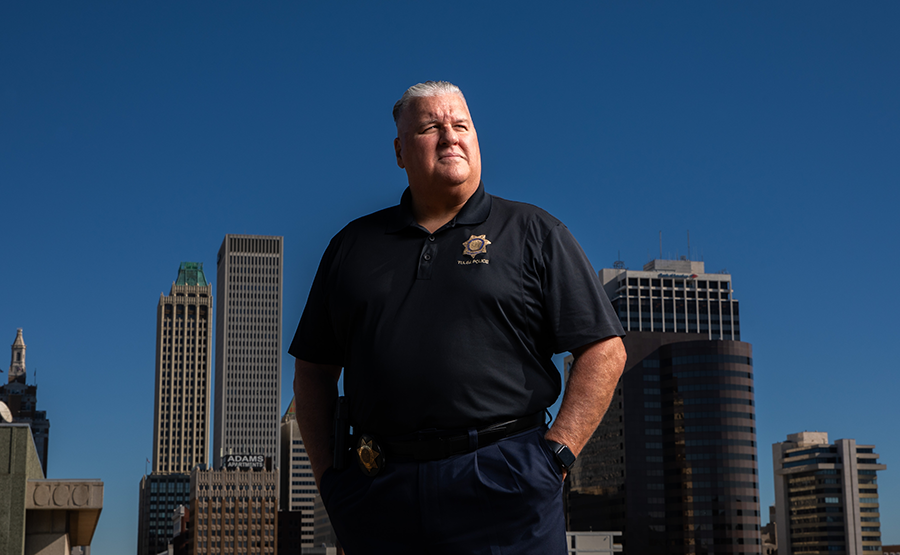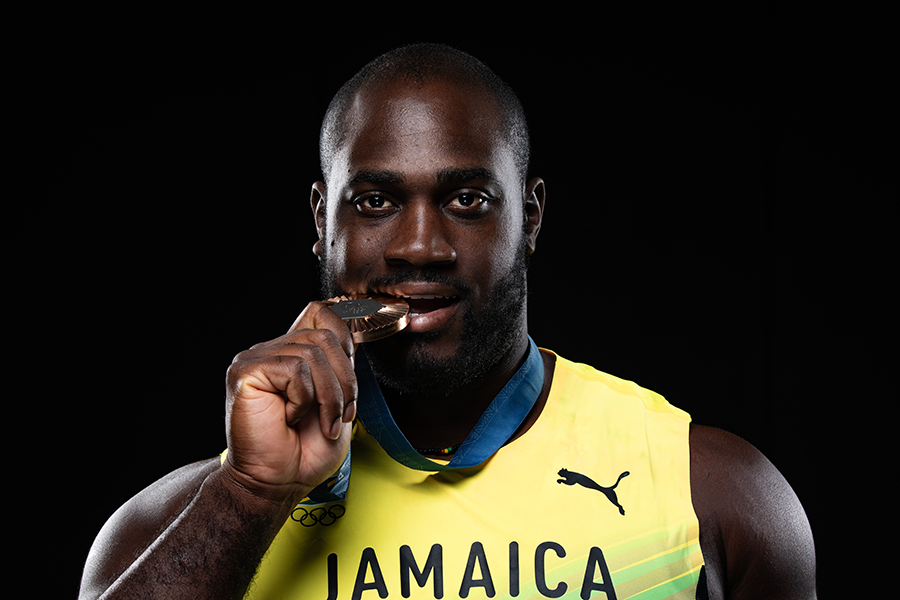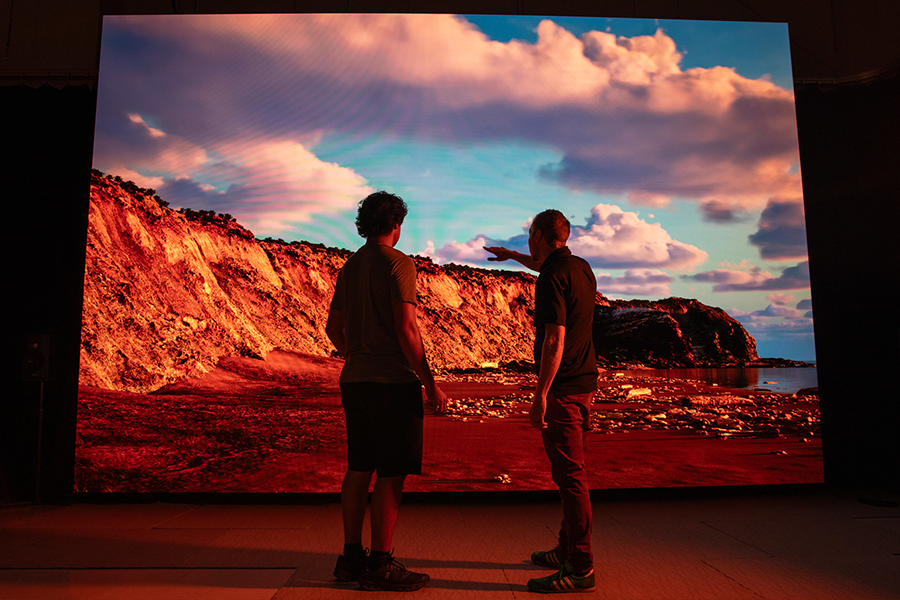A homicide detective leads the two cameramen through the crime scene. The details are gruesome and bloody but important. Real people are affected by heinous actions of others, and it’s up to Detective Mark Kennedy, ‘85, and the Tulsa Police Department to solve these cases, and they often do. So frequently and successfully, in fact, that Tulsa’s homicide detectives are featured on the A&E documentary series “The First 48.”
“I think I’m close to having the longest tenure in homicide out of everyone else that’s been in the unit,” said Kennedy. “This is something I really love doing. There’s no better feeling than taking someone off the streets that ended a life.”
Although he currently lives in Tulsa, Kennedy is a self-described local boy from Carl Junction. He was recruited to Missouri Southern’s football team as a defensive lineman. For Kennedy, MSSU was a good fit.
“I’m a family guy and all of my family lived close to MSSU and could attend games,” said Kennedy. “The football team was great, and I knew it was a great fit for me.”
In 1985, Kennedy graduated not with a criminal justice degree, but instead a bachelor’s in marketing and management. The mid-80s was a significant time for Walmart as the company expanded its business, and company representatives interviewed students at MSSU, offering Kennedy a place in their management program. He was eventually transferred to Tulsa for a few years to work as assistant manager—and learned that his life was leading elsewhere.
“Walmart’s a great company, and I learned a lot about business while I worked there, but I realized that retail wasn’t my thing,” Kennedy said.
But it was his time at the global company where Kennedy found his next career steps. He befriended the police officers who would follow him when making nightly deposits at the bank.
“They noticed I was looking for something else and told me that the police department was about to start hiring again,” Kennedy said.
From there, Kennedy embarked on the yearlong process of taking the test and applying to the academy, which he accomplished in 1989.
“My wife was kind of shocked at my change in career, but she was very supportive,” he said.
Kennedy was a patrol officer at the Tulsa Police Department for two years post-graduation. He then worked on the tactical response squad, a patrol unit with citywide jurisdiction that responded to all major crimes such as armed robberies, break-ins, burglaries in progress. Kennedy estimates that his team arrested 185 armed robbers.
He spent some time in a vice unit before working in the city’s Fugitive Unit as an investigator in 1999. It was a dangerous unit, since the goal is to chase the worst of the worst like murderers and armed robbers, but Kennedy found it fun. He earned two Medals of Valor and located not just one but two people on “America’s Most Wanted.”
“Earnest and Kaia Jackson fled Bergen County, N.J. and were on the run for 10 years after bonding out on charges of horrible child abuse, taking their remaining children with them,” Kennedy stated. “They were in Florida when ‘America’s Most Wanted’ ran a story on them. By the time authorities received a tip on their whereabouts, the couple had moved on. The next story that aired earned a hit in Tulsa.”
Kennedy and his team were tasked with running down the tipster, who Kennedy says is the real hero in this story.
“A lady said she was watching ‘America’s Most Wanted’ when she recognized the handyman that did some work for her,” said Kennedy. “He looked like Earnest and even did the same work he did while in Florida. She provided the invoice he gave her, and his handwriting was so distinctive, it was immediately identified as Earnest’s.”
But it was 2000, and the team didn’t have today’s technology, so another plan was hatched.
“We worked with a local pizza place called Mazzio’s,” he said. “They had delivered to the address associated with the phone number on the invoice.”
After verifying that the address belonged to the suspect, Kennedy’s team took him down and brought in Earnest Jackson. Both Jackson and his wife Kaia were eventually sent to prison.
Since then, Kennedy started his dream position of homicide detective. Kennedy has been the lead detective on nearly 135 homicides and assisted on many more.
“I felt like this was my calling,” he said. “The opportunity opened in 2005, so I took a swing at it and got lucky enough to be in this unit—I’ve enjoyed every minute of it. We try to get the bad guys off the street as quickly as possible.”
That effort shows through Tulsa’s impressive crime solve rate of a consistent 90-95% (compared to the national average of 52% in 2022). This caught the attention of “The First 48.” The television show follows homicide detectives as they race against the clock to find a lead within 48 hours of the crime or the chances of solving the case are cut in half. The partnership between the police department and the show began in 2014 and has been quite successful.
“I was skeptical at first, but we have been so blessed with that crew,” Kennedy said. “The two crew members are almost a part of the homicide unit.”
“The First 48” has made a positive impact on the police department and the city—many people recognize Tulsa from the show, some only watching the episodes filmed in the city. Kennedy finds that the show has led to more community involvement, helping the department keep crime rates down and solve rates up.
“In this era, community involvement in policing is very important,” said Kennedy. “The show has helped bridge that gap a little bit. ‘The First 48’ shows the more personal side of police officers, and it’s the most accurate depiction of the process of an investigation. We’ve built a great relationship with the crew.”
Kennedy still returns to MSSU for homecoming. He and his college friends can be found outside of the football stadium catching up and reminiscing about the good old days.
“I enjoy returning for the game. I look forward to it every year.”
Now, Kennedy is less than two years from retirement but is still giving the job his all, even occasionally working with his son, who is in the Special Investigations Unit. He is proud of his work, but what he takes pride in the most are his loved ones.
“I’m most proud of my family,” he said. “I’ve been so fortunate to have a wife that’s been very supportive of me doing what I love. My son has been a police officer for seven years, and I’m really proud of him. This job has been a godsend—it’s the best decision I ever made.”




